| Listing 1 - 10 of 16 | << page >> |
Sort by
|
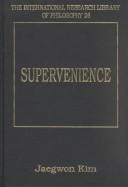
ISBN: 0754620638 Year: 2002 Publisher: Aldershot : Ashgate,
Abstract | Keywords | Export | Availability | Bookmark
 Loading...
Loading...Choose an application
- Reference Manager
- EndNote
- RefWorks (Direct export to RefWorks)
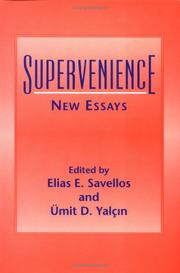
ISBN: 0521450020 0521039649 0511663854 9780521039642 Year: 1995 Publisher: Cambridge : Cambridge University Press,
Abstract | Keywords | Export | Availability | Bookmark
 Loading...
Loading...Choose an application
- Reference Manager
- EndNote
- RefWorks (Direct export to RefWorks)
Supervenience is one of the 'hot discoveries' of analytic philosophy, and this collection of essays on the topic represents an examination of it and its application to major areas of philosophy. The interest in supervenience has much to do with the flexibility of the concept. To say that x supervenes on y indicates a degree of dependence without committing one to the view that x can be reduced to y. Thus supervenience is a relationship that has the potential of replacing the traditional notion of dependence, while performing at least part of the function reductive relationships were supposed to fulfil. Moreover, since it is a topic-neutral concept, supervenience has a wide range of applicability.
Supervenience (Philosophy). --- Supervenience (Philosophy) --- Philosophy --- Arts and Humanities
Book
ISBN: 1859726038 Year: 1997 Publisher: Aldershot Ashgate
Abstract | Keywords | Export | Availability | Bookmark
 Loading...
Loading...Choose an application
- Reference Manager
- EndNote
- RefWorks (Direct export to RefWorks)
Identity (Philosophical concept) --- Self (Philosophy) --- Supervenience (Philosophy)
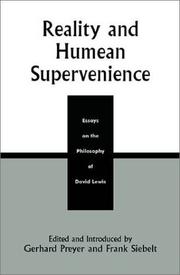
ISBN: 0742512010 Year: 2001 Publisher: Totowa Rowman & Littlefield
Abstract | Keywords | Export | Availability | Bookmark
 Loading...
Loading...Choose an application
- Reference Manager
- EndNote
- RefWorks (Direct export to RefWorks)

ISBN: 0262692309 9780262692304 Year: 2000 Volume: 1 Publisher: Cambridge (Mass.): MIT Press,
Abstract | Keywords | Export | Availability | Bookmark
 Loading...
Loading...Choose an application
- Reference Manager
- EndNote
- RefWorks (Direct export to RefWorks)
Theory of knowledge --- Supervenience (Philosophy) --- Concepts --- Concepts. --- Supervenience (Philosophy). --- Concept formation --- Philosophy --- Abstraction --- Knowledge, Theory of --- Perception --- Psychology
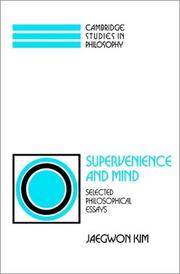
ISBN: 0521433940 0521439965 0511625227 Year: 1993 Publisher: Cambridge : Cambridge university press,
Abstract | Keywords | Export | Availability | Bookmark
 Loading...
Loading...Choose an application
- Reference Manager
- EndNote
- RefWorks (Direct export to RefWorks)
Jaegwon Kim is one of the most pre-eminent and most influential contributors to the philosophy of mind and metaphysics. This collection of essays presents the core of his work on supervenience and mind with two sets of postscripts especially written for the book. The essays focus on such issues as the nature of causation and events, what dependency relations other than causal relations connect facts and events, the analysis of supervenience, and the mind-body problem. A central problem in the philosophy of mind is the problem of explaining how the mind can causally influence bodily processes. Professor Kim explores this problem in detail, criticises the nonreductionist solution of it, and offers a modified reductionist solution of his own. Both professional philosophers and their graduate students will find this an invaluable collection.
Arts and Humanities --- Philosophy --- Philosophy of mind. --- Supervenience (Philosophy) --- Philosophy of mind --- Mind, Philosophy of --- Mind, Theory of --- Theory of mind --- Cognitive science --- Metaphysics --- Philosophical anthropology --- Supervenience (Philosophy).

ISBN: 0262194317 0262283360 9780262283366 9780262194310 0262692309 9780262692304 0262692309 9780262692304 9780262194310 Year: 2000 Publisher: Cambridge, Mass. : MIT Press,
Abstract | Keywords | Export | Availability | Bookmark
 Loading...
Loading...Choose an application
- Reference Manager
- EndNote
- RefWorks (Direct export to RefWorks)
A good understanding of the nature of a property requires knowing whether that property is relational or intrinsic. Gabriel Segal's concern is whether certain psychological properties -- specifically, those that make up what might be called the "cognitive content" of psychological states -- are relational or intrinsic. He claims that content supervenes on microstructure, that is, if two beings are identical with respect to their microstructural properties, then they must be identical with respect to their cognitive contents. Segal's thesis, a version of internalism, is that being in a state with a specific cognitive content does not essentially involve standing in any real relation to anything external. He uses the fact that content locally supervenes on microstructure to argue for the intrinsicness of content. Cognitive content is fully determined by intrinsic, microstructural properties: duplicate a subject in respect to those properties and you duplicate their cognitive contents. The book, written in a clear, engaging style, contains four chapters. The first two argue against the two leading externalist theories. Chapter 3 rejects popular theories that endorse two kinds of content: "narrow" content, which is locally supervenient, and "broad" content, which is not. Chapter 4 defends a radical alternative version of internalism, arguing that narrow content is a variety of ordinary representation, that is, that narrow content is all there is to content. In defending internalism, Segal does not claim to defend a general philosophical theory of content. At this stage, he suggests, it should suffice to cast reasonable doubt on externalism, to motivate internalism, and to provide reasons to believe that good psychology is, or could be, internalist.
Supervenience (Philosophy) --- Concepts. --- Concept formation --- Abstraction --- Knowledge, Theory of --- Perception --- Psychology --- Philosophy
Book
ISBN: 185972096X Year: 1995 Publisher: Aldershot Avebury
Abstract | Keywords | Export | Availability | Bookmark
 Loading...
Loading...Choose an application
- Reference Manager
- EndNote
- RefWorks (Direct export to RefWorks)
Identity (Philosophical concept) --- Materialism --- Mind and body --- Philosophy of mind --- Supervenience (Philosophy)

ISBN: 9780815330646 9780815330653 9780815330660 9780815330677 9780815333821 0815330642 0815330650 0815330669 0815330677 081533382X 9781315052731 9781135668228 9781135668297 9781135668365 Year: 1999 Publisher: London : Routledge,
Abstract | Keywords | Export | Availability | Bookmark
 Loading...
Loading...Choose an application
- Reference Manager
- EndNote
- RefWorks (Direct export to RefWorks)
Metaphysics --- Métaphysique --- Causation. --- Time. --- Modality (Logic) --- Philosophy of nature. --- Supervenience (Philosophy) --- Nominalism. --- Realism. --- Identity (Philosophical concept) --- Individuation (Philosophy) --- Modality (Logic). --- Supervenience (Philosophy). --- Identity (Philosophical concept). --- Individuation (Philosophy). --- Métaphysique --- Nominalisme. --- Réalisme. --- Realisme (filosofie). --- Modalité (logique)
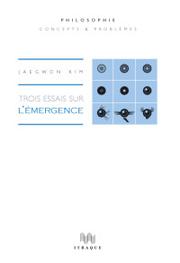
ISBN: 2916120025 9782916120027 Year: 2006 Publisher: Paris: Ithaque,
Abstract | Keywords | Export | Availability | Bookmark
 Loading...
Loading...Choose an application
- Reference Manager
- EndNote
- RefWorks (Direct export to RefWorks)
Que veut-on dire lorsqu'on affirme que l'esprit, ou la conscience, émerge de la matière ? A quels concepts fait-on appel, et quelle représentation du monde se trouve alors convoquée ? Dans ces trois essais philosophiques, pour la première fois rassemblés, le philosophe américain Jaegwon Kim examine et critique la notion d'émergence et l'image générale du monde qu'elle implique. Ces études s'ordonnent autour de trois problèmes fondamentaux : Qu'est-ce que l'émergence ? Qu'est-ce qui caractérise les propriétés émergentes et les distingue des propriétés simplement résultantes ? Les propriétés émergentes, pour autant qu'elles existent, ont-elles des pouvoirs causaux spécifiques ? Est-il cohérent de soutenir que les entités émergentes sont capables d'exercer dans le monde des pouvoirs causaux inédits, susceptibles d'influencer leurs propres constituants ? Existe-t-il une unique hiérarchie de niveaux englobant l'ensemble des étants ? La nature est-elle réellement organisée selon une structure scalaire, un système hiérarchisé où chaque niveau est engendré à partir d'une complexité croissante ? Répondant tour à tour à ces questions, Jaegwon Kim identifie le projet émergentiste à une forme de matérialisme non réductionniste et propose une critique méthodique et vigoureuse des espoirs et des illusions soulevés par une telle entreprise.
Supervenience (Philosophy) --- Causation. --- Survenance (Philosophie) --- Causalité --- Philosophy of mind. --- Emergence (Philosophy). --- Supervenience (Philosophy). --- Philosophie de l'esprit --- Emergence (Philosophie) --- Causalité --- Émergence (philosophie) --- Causalité. --- Esprit et corps. --- Philosophie de l'esprit.
| Listing 1 - 10 of 16 | << page >> |
Sort by
|

 Search
Search Feedback
Feedback About UniCat
About UniCat  Help
Help News
News